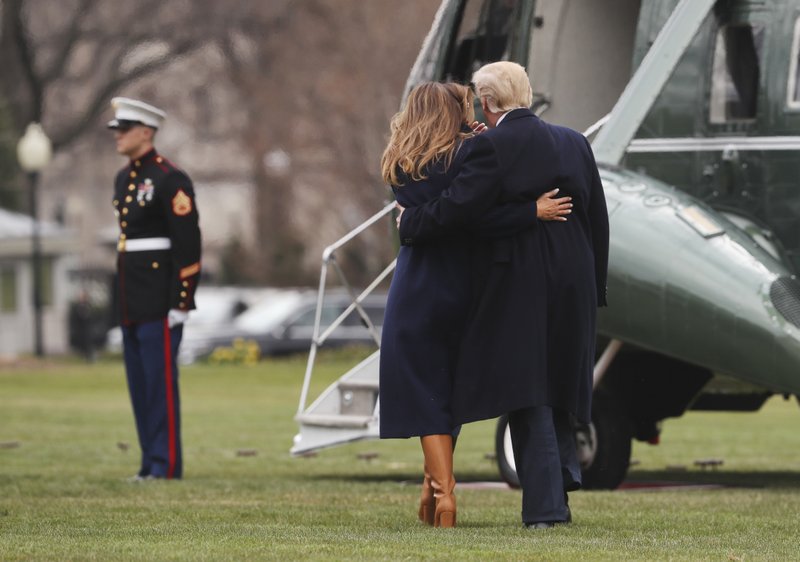MANCHESTER, N.H. -- President Donald Trump vowed Monday to end the "scourge of drug addiction in America," embracing stiffer penalties, including the death penalty, for drug traffickers.
"Toughness is the thing that they most fear," Trump said.
The president traveled to New Hampshire, a state with the nation's third-highest rate of deaths from overdoses and which is also an early marker for the re-election campaign he has already announced, to announce the plan. The president called for broadening awareness about drug addiction while expanding access to proven treatment and recovery efforts, but the backbone of his plan is to toughen the punishment for those caught trafficking highly addictive drugs.
"This isn't about nice anymore," Trump said. "This is about winning a very, very tough problem and if we don't get very tough on these dealers it's not going to happen folks. ... I want to win this battle."
"Failure is not an option," Trump said in a speech at Manchester Community College. "Addiction is not our future."
The president formalized what he had long mused about publicly and privately: that if a person in the U.S. can get the death penalty or life in prison for shooting one person, a similar punishment should be given to a drug dealer who potentially kills thousands.
Trump has long spoken approvingly about countries like Singapore that have fewer problems with drug addiction because they harshly punish their dealers. During a trip to Asia last fall, he did not publicly rebuke Philippines President Rodrigo Duterte, who authorized extrajudicial killings of his nation's drug dealers.
"Drug traffickers kill so many thousands of our citizens every year," Trump said. "That's why my Department of Justice will be seeking so many tougher penalties than we've ever had and we'll be focusing on the penalties that I talked about previously for big pushers, the ones that are killing so many people, and that penalty is going to be the death penalty."
He added: "Other countries don't play games. ... But the ultimate penalty has to be the death penalty."
Although Trump once again spoke extensively about expanding the federal death penalty for drug dealers, his administration released a three-page list of proposals before his speech that ruled out any change to existing federal law, suggesting instead that the Justice Department would take a more aggressive stance toward those offenders already eligible to be put to death based on other capital offenses, such as drug-related murders.
The Justice Department said the federal death penalty is available for limited drug-related offenses, including violations of the "drug kingpin" provisions in federal law.
On a call with reporters Sunday afternoon to describe the plan, White House officials said the administration will seek the death penalty in the case of certain drug traffickers -- not dealers as Trump had said at a rally in Pennsylvania earlier this month.
"The Department of Justice will seek the death penalty against drug traffickers when it's appropriate under current law," Andrew Bremberg, who leads the Domestic Policy Council, said on the briefing call.
It is not clear if the death penalty, even for traffickers whose product causes multiple deaths, would be constitutional. Doug Berman, a law professor at Ohio State University, predicted the issue would be litigated all the way to the U.S. Supreme Court.
[PRESIDENT TRUMP: Timeline, appointments, executive orders + guide to actions in first year]
QUESTION OF FUNDING
Opioids, including prescription opioids, heroin and synthetic drugs such as fentanyl, killed more than 42,000 people in the U.S. in 2016, more than any other year on record, according to the Centers for Disease Control and Prevention.
Trump has declared that fighting the epidemic is a priority for the administration, but critics say the effort has fallen short.
In October, the president declared the crisis a national public health emergency, short of the national state of emergency sought by a presidential commission he put together to study the issue.
On Monday, Trump called for a nationwide public awareness campaign, which he announced in October, to scare kids away from dabbling in drugs. He announced a new website, www.crisisnextdoor.gov, where members of the public can share stories about the dangers of opioid addiction.
Trump said the administration will work to cut the number of opioid prescriptions that are filled by one-third within three years, and to expand access to treatment and recovery tools such as the overdose-reversing drug naloxone.
The president also discussed how his policies, including a U.S.-Mexico border wall and punishing "sanctuary" cities that refuse to comply with federal immigration authorities, would help reduce the flow of drugs and help end the addiction epidemic.
The proposal lacks details on federal spending, however. That, and the administration's separate proposals for major cuts to Medicaid, the chief source of funds for people seeking treatment for drug addiction, is causing advocates to question the president's commitment.
Administration officials have shifted questions about funding to Congress, which has yet to coalesce on how to address the epidemic, much less how to pay for a plan.
Congress recently allotted $6 billion to address the epidemic over the next two years, which public health experts have described as a good start but not anywhere near enough.
Kellyanne Conway, a Trump adviser who has been working on the issue, told reporters aboard Air Force One that Trump wants $13 billion.
Information for this article was contributed by Darlene Superville, Jonathan Lemire and Mark Sherman of The Associated Press; by Maggie Haberman and Abby Goodnough of The New York Times; and by Noah Bierman and Noam N. Levey of Tribune News Service.
A Section on 03/20/2018
